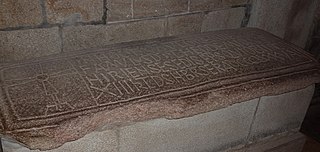See also
- Theodemir, a related given name
Teodomiro is a masculine given name which may refer to:

Theodoric is a Germanic given name. First attested as a Gothic name in the 5th century, it became widespread in the Germanic-speaking world, not least due to its most famous bearer, Theodoric the Great, king of the Ostrogoths.
Theodemir or Theudimer was a Visigothic comes (count) prominent in the southeast of Carthaginensis during the last decades of the Visigothic kingdom and for several years after the Arab conquest. He ruled seven cities in southeastern Spain, mentioned in the Treaty of Orihuela that was preserved by the Andalusian historian Ibn Adarí in the thirteenth century: Orihuela, Valentila, Alicante, Mula, Bigastro, Eyya, and Lorca.

Andrade is a surname of Galician origin, which emerged in the 12th century as the family name of the knights and lords of the small parish of San Martiño de Andrade, in the municipality of Pontedeume. The first mention of this small territory is to be found in the documentation of the monastery of San Xoán de Caaveiro, and belong chronologically to the 9th century. It was part of the region of Pruzos, which was created as an administrative and ecclesiastical territory of Kingdom of Galicia in the sixth century by King Teodomiro through a document written in Latin called Parrochiale suevum, Parochiale suevorum or Theodomiri Divisio. From the 12th century Pruzos, and therefore Andrade, were integrated into the county of Trastámara that belonged to the lineage Traba, the most powerful Galician family. By this same time the family group: Fortúnez, begins to unite their names Andrade as surname, since in this parish their family home was located. The knights of Andrade were faithful vassals of their lords the Counts of Trastámara throughout the middle centuries of the Middle Ages.
The Amali – also called Amals, Amalings or Amalungs – were a leading dynasty of the Goths, a Germanic people who confronted the Roman Empire during the decline of the Western Roman Empire. They eventually became the royal house of the Ostrogoths and founded the Ostrogothic Kingdom.

Mondoñedo is a small town and municipality in the Galician province of Lugo, Spain. As of 2009, the town has a population of 4,508. Mondoñedo occupies a sheltered valley among the northern outliers of the Cantabrian Mountains. Despite being the core of the region of A Mariña Central, it is the city with the fifth biggest population after Viveiro, Ribadeo, Foz and Burela.
Chararic or Chararich was the King of Galicia according to Gregory of Tours, who is the only primary source for a Suevic king of this name.

Theodemir or Theodemar was one of the last Suevic kings of Galicia and one of the first Chalcedonian Christians to hold the title. He succeeded Ariamir sometime between the end of May 561 and the year 566 and ruled until his death.

The Diocese of Mondoñedo-Ferrol is a Latin diocese of the Catholic Church in Spain. It is the northernmost of the four suffragan dioceses in the ecclesiastical province of the Metropolitan Archdiocese of Santiago de Compostela, which covers Galicia in the northwest of Spain. The area had previously been home to Britonia, a settlement founded by expatriate Britons in the wake of the Anglo-Saxon invasion of Britain. Britonia was represented by the diocese referred to as Britonensis ecclesia in sources from the 6th and 7th centuries.

Foz is a town and municipality in the A Mariña Central comarca in the Galician province of Lugo. It has been historically linked to the Ancient Province of Mondoñedo and also linked to the arrival of Briton immigrants during the Dark Ages fleeing by sea from the British Isles. It has 9800 inhabitants. It borders the coastal municipalities of Burela and Barreiros, and the inland municipalities of Lourenzá, Mondoñedo, O Valadouro, Alfoz, and Cervo.
Theodemir, Theodemar, Theudemer or Theudimer was a Germanic name common among the various Germanic peoples of early medieval Europe. According to Smaragdus of Saint-Mihiel, the form Theudemar is Frankish and Theudemir is Gothic.

Ariamir was the Suevic King of Galicia, with his capital at Bracara, from 558/9. The bishops of the First Council of Braga recorded Ariamir as the king who summoned them and under whose auspices they deliberated. Because the bishops mention theirs as being the first Nicene synod to be held in Galicia in a long while, Ariamir is sometimes assumed to have been the king who led the conversion of his people from Arianism to orthodoxy and thus to have lifted the ban on Nicene councils.

Saint Rudesind was a Galician bishop and abbot. He was also a regional administrator and military leader under his kinsmen, the Kings of León.
Adulfus is a given name. Notable people with the name include:

Diego de Arce y Reinoso Ávila y Palomares was a Spanish bishop who served as Grand Inquisitor of Spain from 1643 to 1665; and as Bishop of Plasencia (1640–1652), Bishop of Ávila (1637–1640), and Bishop of Tui (1635–1637).

Theodemir or Theodomar, was a bishop of Iria, in Galicia.
Francisco Torres Grijalba was a Roman Catholic prelate who served as Bishop of Mondoñedo (1648–1662).
Isidoro Caja de la Jara was a Roman Catholic prelate who served as Bishop of Mondoñedo (1582–1593).
Antonio Valdés Herrera was a Roman Catholic prelate who served as Bishop of Córdoba (1653–1657), Bishop of Osma (1641–1643), Bishop of Oviedo (1636–1641), and Bishop of Mondoñedo (1633–1636).
Saint Theodemir, Martyr, Patron of Carmona, was a Spanish Benedictine monk who died July 25, 851 in Córdoba.
Nuño (Spanish) or Nunyo (Catalan) is a masculine given name of Latin origin. Its Portuguese form is Nuno. Its patronymic is Núñez. Already in the Middle Ages the name was being confused with the similar but distinct name Munio.